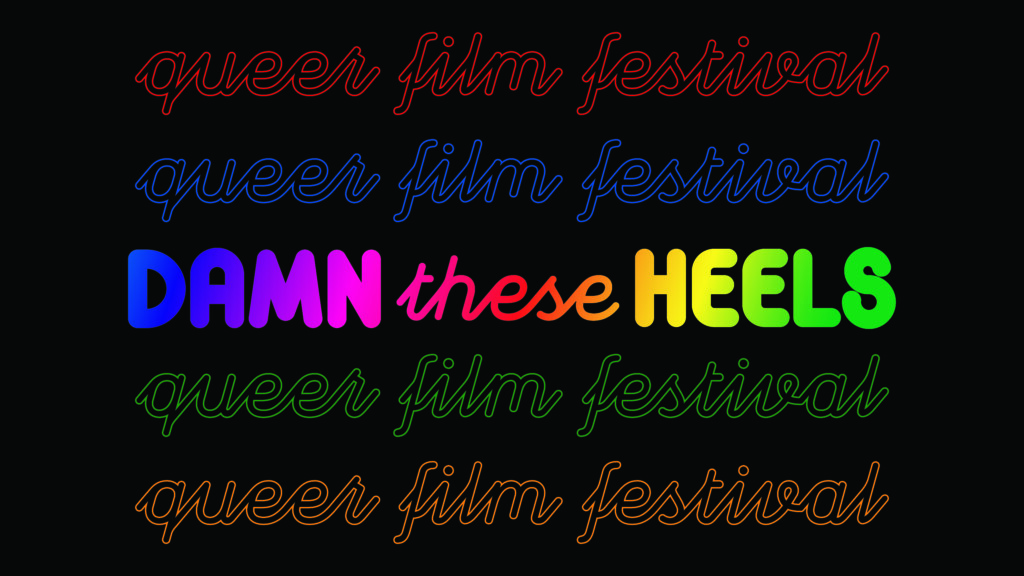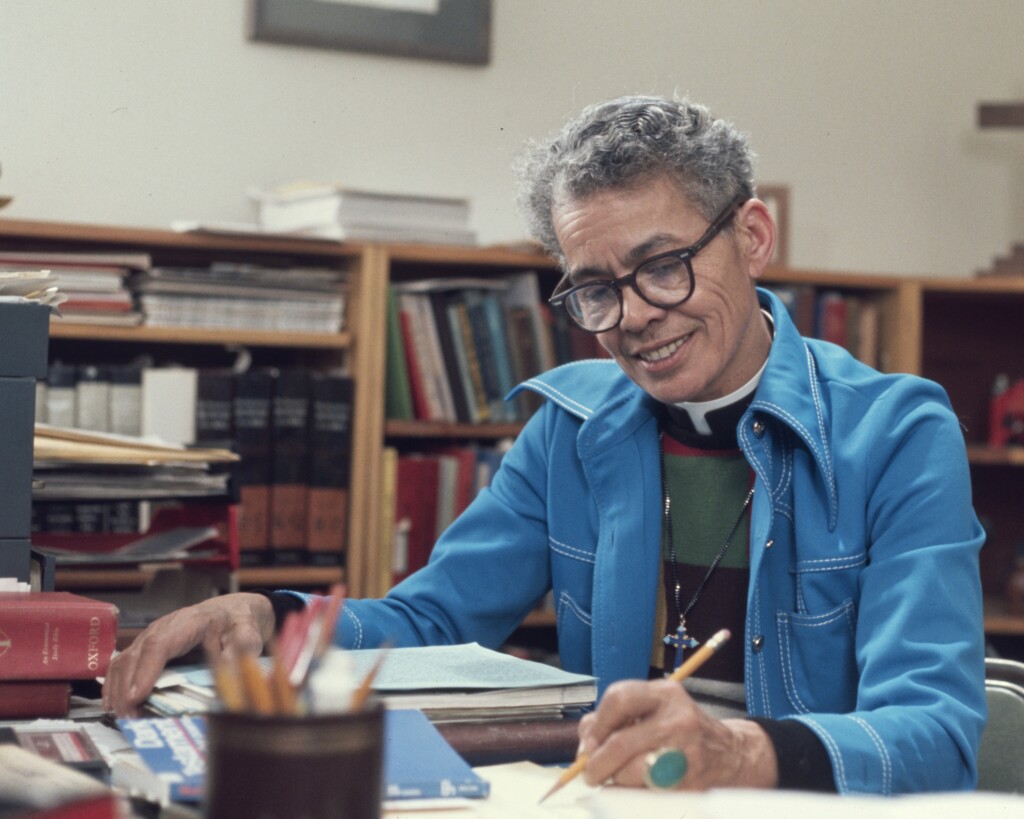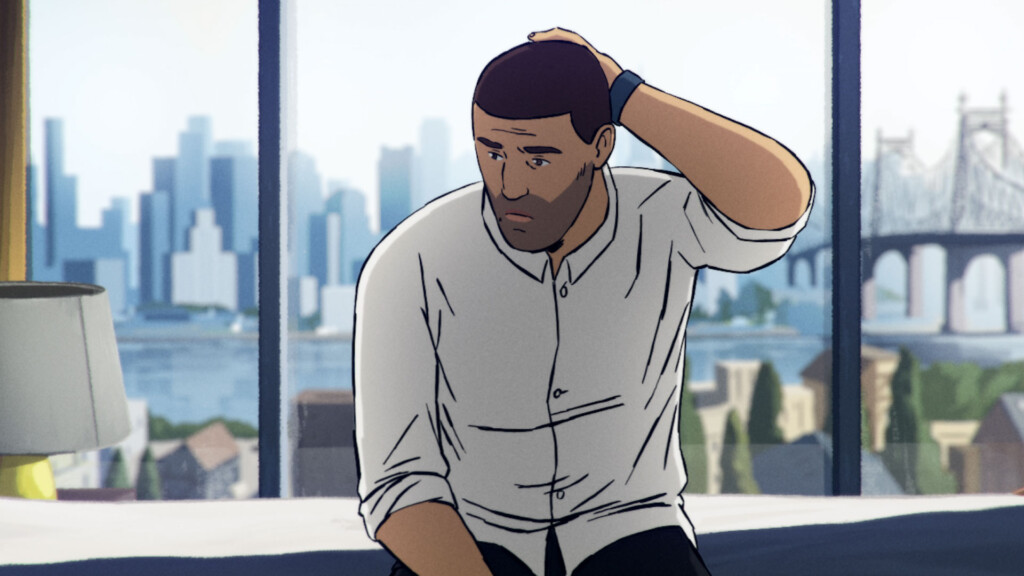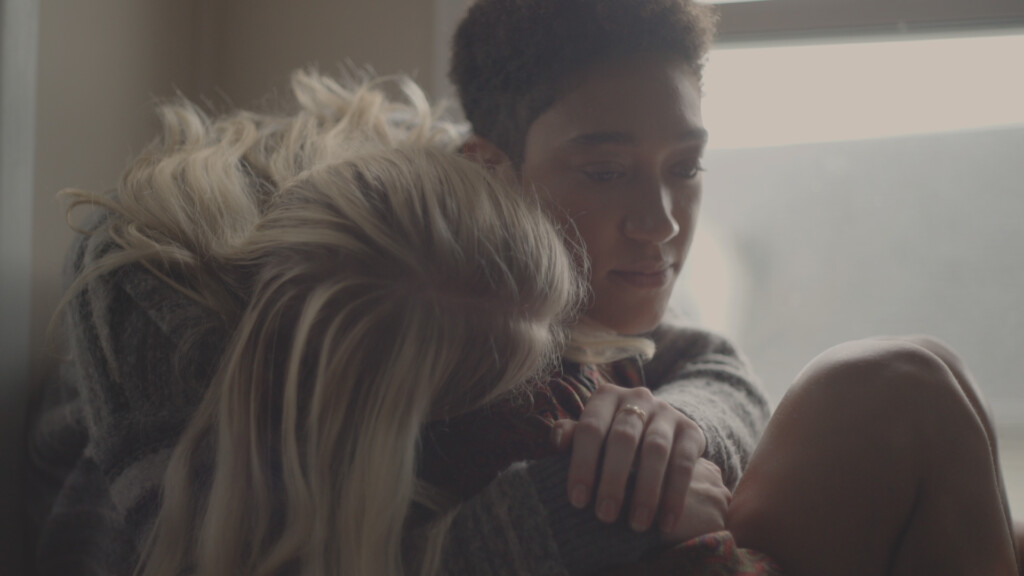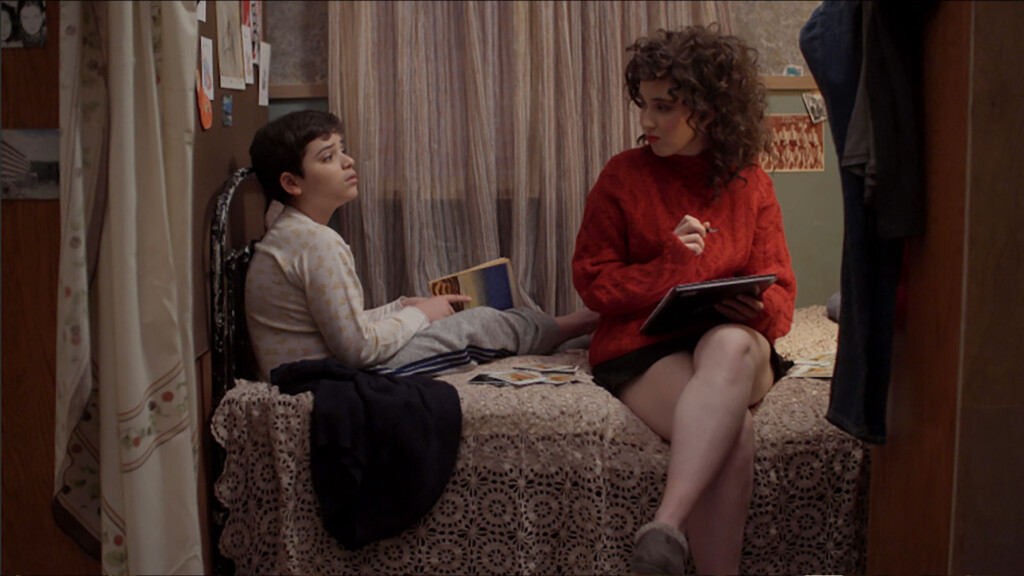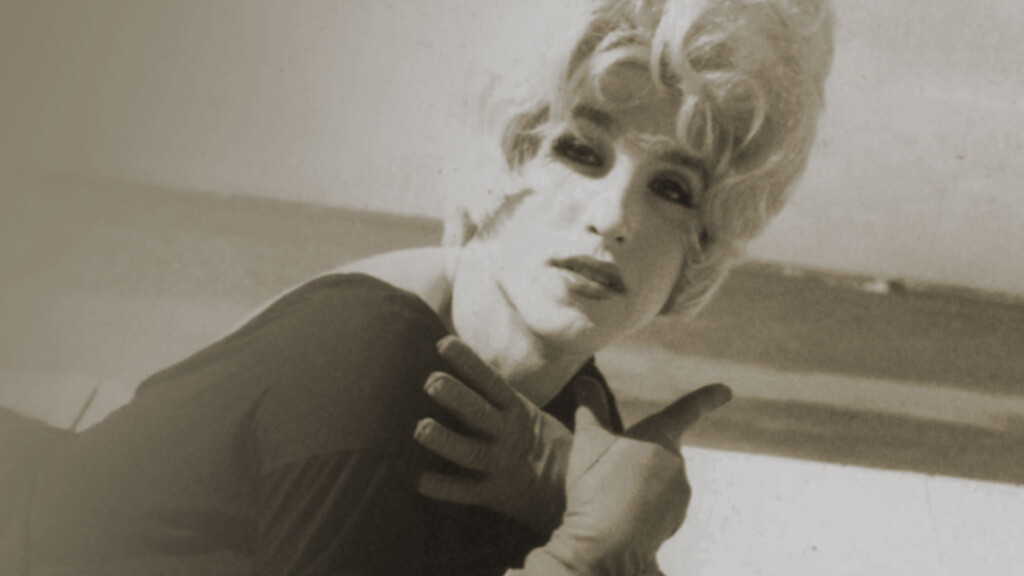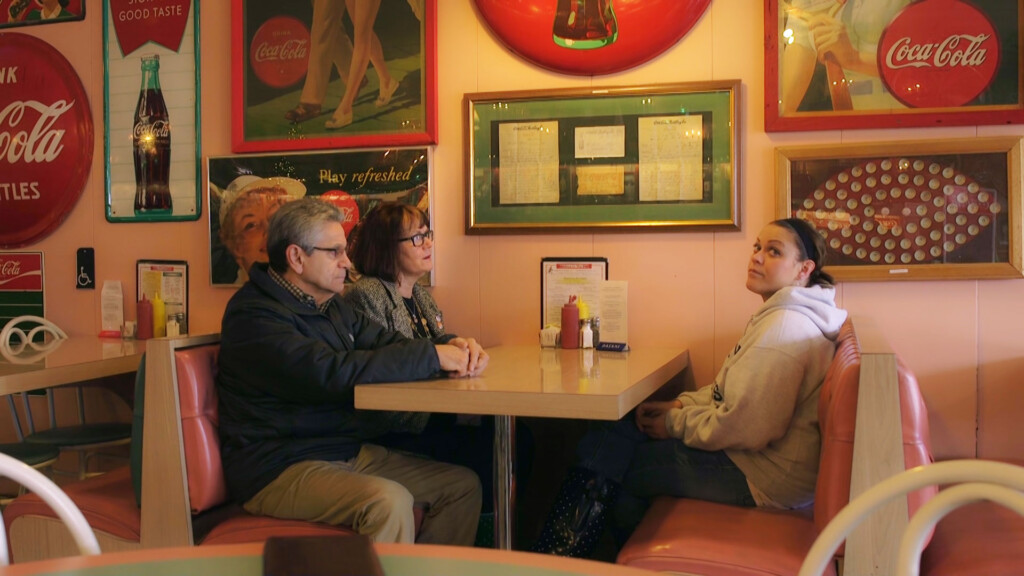EDITOR’S NOTE: The Utah Review is providing daily coverage of the Utah Film Center’s 18th annual Damn These Heels Queer Film Festival. Follow daily for feature reviews of the 2021 slate during the festival.
The Utah Film’s Center’s 18th annual Damn These Heels Queer Film Festival, the longest running festival of its kind in the Intermountain West, will open July 9 with its largest slate ever, running through July 18. Two things are immediately evident. The feature narrative films stand out as the strongest fictional offerings in the festival’s history, accentuated by authentic representation of queer characters on the screen whose lives are given their full due in comprehensive story arc development. Documentaries pop with treasure troves of primary sources, which fill significant gaps in chronicling queer history before and after the Stonewall uprising, unquestionably the pivotal event in fortifying the momentum of the queer movement. Damn These Heels organizers, led by its new programming director Ash Hoyle, have raised the festival’s distinguished bar of quality to a benchmark acknowledging queer cinema’s appeal not only for its targeted audiences but also for all moviegoers.
This year’s festival is a hybrid of online streaming options, live in-person screenings at the Rose Wagner Center for Performing Arts and opening and closing events at the Utah State Fairpark and Liberty Park, respectively.
While the pandemic may have delayed production and post-production on numerous film projects in general, submissions for this year’s festivals confirm that this was not a concern. “It was a rich pool for us this year,” Hoyle says, adding that it was definitely more feast than famine in every category. Unquestionably, resilience and perseverance are common traits in the production culture and the storytelling essence of the films in the Damn These Heels slate. Hoyle takes particular note of how strong storytelling elements in nonfiction are reshaping and help audiences discover dimensions of queer history that previously had not been as visible as they could have been.
Among the slate of 25 feature-length and 25 short films are numerous examples of how queer cinema is recognized for its excellence in broadening and deepening the community of storytelling emphasizing the ebullience of gender, sex and identity in its most diverse range of expressions. The slate includes four films that were screened at this year’s Sundance: Flee (Denmark/France/Sweden/Norway, directed by Jonas Poher Rasmussen); Ma Belle, My Beauty (directed by Marion Hill), My Name Is Pauli Murray (directed by Betsy West and Julie Cohen) and We’re All Going To The World’s Fair (directed by Jane Schoenbrun). Receiving its Utah premiere, as with many of the festival offerings, the documentary No Straight Lines, directed by Vivian Kleiman, for example, not only has been selected for queer film festivals but also has achieved the trifecta envied by every documentarian, as the film was selected for Tribeca, Sheffield Doc/Fest, and the American Film Institute’s AFI DOCS Film Festival. Kleiman’s film offers a comprehensive primer of the history of queer comic book artists from the last 40 years, ranging from underground days to the HIV/AIDS crisis and to more visible platforms and acceptance especially in graphic novels and digital media formats.
Flee, which will play on July 17 as a closing weekend event at Liberty Park in downtown Salt Lake City, is a major award winner. At Sundance, it earned the grand jury prize in the World Documentary category. This animated documentary recounts the story of Amin (a pseudonym), who opens up for the first time about his journey as a child refugee from Afghanistan, by risking details that could jeopardize his efforts to build his life with the man to whom he is engaged. Last month, Flee won the top Cristal Award for a feature film at the Annecy International Animation Film Festival, along with the Gan Foundation Award for distribution. Flee and its composer Uno Helmersson also received the award for best original music in a feature film. The Annecy award is significant, given that the films which have received the honor have typically been shortlisted for the Academy Award nominations for best animated feature.
My Name is Pauli Murray will open the festival as a drive-in event at the Utah State Fairpark on July 9, beginning at 7 p.m., and located in the parking lot just south of the Days Of 47 Stadium at the Fairpark. The screening will be preceded by a family-friendly drag show, hosted by Madazon Can-Can and featuring Ivy Dior Stephens, Sequoia, Kay Bye, and Toodles. Music will be provided by DJ Mr. Gizmoe (Zachary Alonzo).
The documentary highlights the legacy of lawyer Pauli Murray, who died in 1985 and who argued for applying the 14th Amendment’s equal protection clause on cases involving gender discrimination. Murray also was the first Black woman to be ordained as an Episcopal priest. The film, which also screened at last month’s AFI DOCS Film Festival, will go into broader distribution later this year through Amazon Studios.
SHORT FILM WORLD AND NORTH AMERICAN PREMIERES
Damn These Heels audiences will have prioritized opportunities to see several short films for the first time in the U.S. Two short films — The Letter, directed by Meredith Morran and True Mother, from Israel, directed by Rotem Gabay — will receive their world premieres at the festival. The Letter is a fascinating 10-minute short, exploring the practicalities of analyzing how we talk to each other and give each other messages and their meanings. It is inspired in part by the dynamics of Edgar Allan Poe’s short story The Purloined Letter and Jacques Lacan’s semiotic analysis of the story. True Mother centers around a custody battle that compels a woman to abduct their child, despite losing the court case to her ex-wife. Three short films will receive their North American premieres at Damn These Heels. From Australia, Stephen Lance’s Torch Song is an electrified drama culminating in the collision of toxic and feminized masculinity in a story with the main character being a male with an additional copy of the X chromosome (clinically referred to as as the Klinefelter’s Syndrome). Personals, directed by Sasha Argirov, focuses on how an anonymous sex encounter changes dynamics after a young man responds to an online ad for glory hole service. Argirov, who lives and works in Vancouver, received a 2020 Sundance Ignite grant for the project. Another Sundance Co//ab project, Talk Soon, directed by Joey Massa, will be screened. The seven-minute film tells the story of a couple who are spending the night together for the first time in more than a year and both hesitate to communicate their feelings after such a long absence.
These short films will be part of several programs, which will be available for streaming throughout the duration of the festival: Through The Cracks, Missed Connections and Apples and Trees. The directors of the five films seeing major premieres will participate July 14 on a Fresh Faces panel, as an online streaming event.
On July 13, at 7 p.m., the Utah LGBTQIA Shorts Program will be presented featuring short films by Brian Knappenberger, Hugo Vaca, Ali Akbari, Armando Lopez and the trio of Guillermo Ramos, Garrett Taylor and Alex Sotelo.
FEATURE-LENGTH NARRATIVES
The fictional narratives provide compelling genuine examples of authenticity in character and narrative. Cicada, directed by Matt Fifer and featuring Sheldon Brown who also has a writing credit for the film, coherently synthesizes elements of trauma, race and self-affirmation of identity. Fifer and Brown are in front of the camera as the film’s two leads, strengthening the narrative potential for its convincing premise. See You Then, directed by Mari Walker, also is a feature-length debut for the director. While the story format is a classic two-hander chamber piece, See You Then commands the viewer’s attention wholly in a conversation that unfolds across one evening in various settings, leading to a shocking epiphany. Viewers should note that the film features a transgender character played by a transgender actor in a story directed by a transgender filmmaker.
From Brazil, Madalena, directed by Madiano Marcheti, revolves around how three characters are affected by the disappearance of a transgender woman. The film, which is the festival’s international centerpiece screening selection, is not a crime drama (as there is no evidence of any police or investigatory presence) but it drives powerfully home the point of just how invisible and vulnerable the transgender community has been in Brazil. The film is set in the center-west region of the country, an agricultural area that rarely is considered a location for films from this South American nation. Aided by sumptuous cinematography and a first-rate soundtrack, Ma Belle, My Beauty, which premiered this year in Sundance’s NEXT program, deals with the realities of a polyamorous relationship. Set in Tel Aviv, Eytan Fox’s Sublet is a solid intergenerational narrative about a gay travel writer from the U.S. and a younger film student who is subletting his place. It is interesting to compare the cultural dynamics of Sublet to Andrew Haigh’s 2011 romantic drama Weekend abut two men who engage in a sexual relationship on the last weekend before one of the men is set to leave the country.
Comedies and devilish campy features also are on the slate. Jonathan Wysocki’s Dramarama is an effective coming-of-age comedy set in California during 1994, as high school drama students gather for one final turn of their favorite ritual: a murder-mystery slumber party. The 2020 film is slated to go into limited theatrical release in the Los Angeles market next month. A more intriguing take on the coming of-age narrative comes in the wholly delightful Potato Dreams of America, which blends autobiographical elements from Wes Hurley, a filmmaker born in Russia and his immigrant experiences in Seattle. Finally, a coming-of-age story line comes in the horror drama We’re All Going to the World’s Fair, the feature-length directorial debut of Jane Schoenbrun. The film, which premiered at Sundance this year, was acquired by HBO Max and Utopia, the U.S. distributor and sales firm. Revolving around a teen who engages with an online horror role-playing game, the story includes scenes in which the actors appeared in real and staged YouTube videos.
Of course, any Bruce LaBruce queer film defies neat genre categorization while managing consistently to have abundant entertaining values. The director’s recent project Saint-Narcisse, set in Canada during the early 1970s, is a drama-comedy with a retro vibe reminiscent of taboo-busting French and Quebec cinema. Buckle in for yet another assortment of strange but curiously satisfying eye candy and characters, which are tantamount to the LaBruce experience. Likewise, the 1970s exploitation genre gets the full sassy camp treatment in Shit and Champagne, D’Arcy Drollinger’s feature-length directorial debut. Absurd is a legitimate aesthetic to appreciate, whether it is in Saint-Narcisse or Shit and Champagne.
DOCUMENTARIES
The documentary slate comprises a full-fledged introduction to queer history on numerous fronts. Cured, directed by Bennett Singer and Patrick Sammon, is an outstanding exploration of the case study dynamics with regard to the academic politics of science and research’s response to issues of sexual identity. The film chronicles the long campaign by activists to remove homosexuality from the American Psychiatric Association’s (APA) official manual, The Diagnostic and Statistical Manual of Mental Disorders (DSM), in the 1960s and 1970s.
Primary source materials become treasure troves in some of the most stellar documentary offerings. Highlighting the history of the New York City gay scene pre-Stonewall, P.S. Burn This Letter Please, directed by Michael Seligman and Jennifer Tiexiera, is an archival blockbuster, featuring letters from more than 60 years ago with the accounts and details confirmed and verified by the figures involved, many of whom are in their late eighties or early to mid-nineties. Similarly, more than 250 hours of film footage from the homegrown gay porn studio Palm Drive Video become the center of Raw! Uncut! Video!, directed by Ryan Smith and Alex Clausen, a fascinating documentary about sex and kink positivity in the 1970s and 1980s and the development of safe sex practices as the HIV/AIDS crisis became more prevalent.
Genderation, directed by Monika Treut, comes two decades after Truet’s documentary Gendernauts: A Journey Through Shifting Identities, which was filmed in San Francisco. Treut returns to see what has changed with the transgender and non-binary subjects of the earlier film, which leads to fascinating longitudinal observations about what has changed and why the stories of the original gendernauts matter for 21st century generations. The film touches extensively, for example, on gentrification in the Bay Area and the loss of the adventurous cultural spirit upon which gendernauts had thrived upon in previous decades. Ahead of the Curve, directed by Jen Rainin and Rivkah Beth Medow, documents the story of Franco Stevens, who founded Curve, one of the world’s most prominent lesbian lifestyle magazines. With a post-punk musical score, Rebel Dykes, directed by Harri Shanahan and Siân A. Williams, chronicles the history from the 1980s when lesbians in London organized feminist protests, anti-Thatcher rallies and campaigns surrounding HIV/AIIDS and the U.K.’s anti-gay Section 28 law. No Ordinary Man, directed by Aisling Chin-Yee and Chase Joynt, chronicles the life of jazz musician Billy Tipton, whose female birth sex was not revealed until after the musician’s death in 1989. The Conductor is Bernadette Wegenstein’s profile of Marin Alsop and follows the rise of the first woman to become principal conductor of an American symphonic orchestra.
Patric Chiha’s dance documentary If It Were Love stands out for presenting the dance artists in their own personalities, not a common feature of such films dealing with this performing art form. The dancers are preparing Crowd, a choreographed work by Gisèle Vienne, which is an homage to the rave scene of the 1990s and it is intriguing to see how the dancers respond to the work through their life experiences.
One of the most profoundly moving documentary stories in this year’s slate, Instructions for Survival, a German film directed by Yana Ugrekhelidze, focuses on a transgender man in the Republic of Georgia whose basic rights have been stripped. Alex cannot be hired nor seek professional medical care and he is prevented from changing the gender on his official papers including a passport. Eventually, Alex and his partner, Marie (a cisfemale), who becomes a surrogate mother so they can have the financial means to seek asylum in the country, make the consequential decision.
North By Current, a Sundance Institute supported project which is directed by Angelo Madsen Minax, brings the filmmaker to his rural hometown in Michigan after the death of his niece. Minax realizes that the film he ends up making goes deeper into his own story as a transgender man returning to family members who struggle with his post-transition identity.
A sneak preview screening of Sediments, a documentary from Spain directed by Adrián Silvestre, also will be available. The film follows the stories of six transgender women, as they travel to a small town in León.
Screenings at the Rose Wagner Center for Performing Arts will be offered on July 10-11 for the following films: Ahead of the Curve, Cicada, Cured, No Straight Lines, P.S. Burn This Letter Please, Saint-Narcisse and See You Then.
Other online events include Kick Off Your Heels Community Conversations at 6 pm. On July 12 and July 15. Mr. Gizmoe also will perform an online set of music July 16 at 8 p.m.Tickets and information are available at the Damn These Heels webpage

